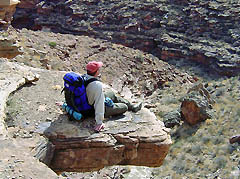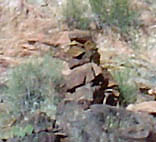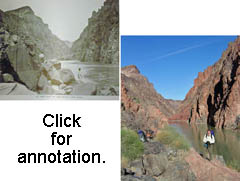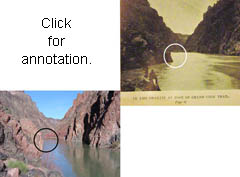|
As I noted in my blog introduction, I had started down the so-called Old
Grandview Trail in 1984 and made it to the river. But, I was so sure I had
missed the real trail, I always wanted to go back and scout out this route
again. So, with hiking buddy John Eastwood, we headed up to the
Grandview Trail early on Saturday morning, March 4.
Our first surprise was the amount of trail work that had been done on the
upper section, in the Kaibab limestone. The trail had been closed
for a long time last year, and a lot of good work has been done. In
fact, it was closed soon after I made a trip down to Horseshoe Mesa, and I
mentioned to a member of the trail crew, soon thereafter, that a section of
the Supai had washed away. Unlike this winter, last winter there was
lots of snow and rain.
As you can see from the photos below, the trail looks very good - that
hasn't always been the case. Apparently, a huge rockslide wiped out a
big chunk of the upper trail. In fact, in one spot, the trail used
to go between the cliff and a very large boulder - the latter is no longer
there. What is really neat about the trail work is that it
replicates the old look of the trail with lots of wood cribbing used to
shore up the trail bed. You do still hang out over the edge a bit,
but the trail is in better shape and wider as well.
The trail improvements extend to the long stretch through the Supai.
That used to be very rocky and, at times, a bit indistinct. But, it
is much broader and easier to follow now. And, there have been a few
other improvements, most notably is the shoring up of the cobblestoned
sections that had been starting to erode away.
 In a little over three and a half hours, John and I were lunching beside a
small waterfall in Cottonwood Creek, off the west side of Horseshoe Mesa,
where the Tonto Trail crosses. It was clear and the temperatures
were pleasant. While here, we saw our second hiker of the day, so it
was not crowded! [The photo, at left, is on a ledge along the Tonto
Trail.]
In a little over three and a half hours, John and I were lunching beside a
small waterfall in Cottonwood Creek, off the west side of Horseshoe Mesa,
where the Tonto Trail crosses. It was clear and the temperatures
were pleasant. While here, we saw our second hiker of the day, so it
was not crowded! [The photo, at left, is on a ledge along the Tonto
Trail.]
The old trail drops down through the Tapeats cliffs as the Tonto Trail
rounds the bend from Cottonwood Canyon to Grapevine Canyon. It
really does seem improbable, as we can look down the thousands of feet to
the river from this area, and it is very steep. We did, in fact,
miss the old trail junction, which is actually well-marked by a pile of
rocks. We were just clueless about how that happened, since we had
been here a few yea rs
ago, and knew about where the spot was located. Still, as we rounded
the bend into Grapevine, we knew we had to backtrack to get to the old
trail. rs
ago, and knew about where the spot was located. Still, as we rounded
the bend into Grapevine, we knew we had to backtrack to get to the old
trail.
Soon enough, we were on the old trail and we followed it, without fail,
all the way to the river. Not only was the path easy to follow
(still, it seems mostly a game trail), but there are numerous small cairns
dotting the route, which I don't remember seeing in 1984. [Near the
river, there is a large cairn on the west side of the ravine, pictured to
the right, which Butchart refers to as an "old miner's claim."]
At the river, there were small sandy spots and lots of rocks. We
really couldn't go very far in either direction - Harvey Butchart's 50
yard estimate seems about right to me. The river was a dark green
color, which is a good sign when you are counting on that as a water
source. When it is brown, filtering out the sediment can be excruciating.
We reached the river at about 5:30 p.m. with just enough time to soak my
tired feet in the water and for us to fix, and eat dinner. With
darkness, we pulled out our space blanket mummy bags, which were just
right for the early morning hours.
In the morning, I played a joke on John. The previous evening, when
he was retrieving water from a little sand bar island, I noticed I could
hear him but not see him. So, this morning, when I was getting
water, I grabbed a rock when I was on the little island. Out loud, I
was commenting about how odd an angle it was to dip the bottles into the
river. Then, I let out an “Eek!” and tossed the big rock into
the river. John shot up from his spot and was frantic for a couple
of seconds, and when I could see him, I just broke out laughing.
Well, I just couldn’t resist.
 I spent some time trying to match up the photo from Holmes, but I couldn't
find any of the big rocks in that old picture. Still, I matched up
the view real well - the sloping cliff on the south side of the river, the
background cliffs, the projecting fin that is just this side of Vishnu
Creek and two rock projections into the water. The two photos are
shown to the right. Click on them to see a larger version, with some
annotation.
I spent some time trying to match up the photo from Holmes, but I couldn't
find any of the big rocks in that old picture. Still, I matched up
the view real well - the sloping cliff on the south side of the river, the
background cliffs, the projecting fin that is just this side of Vishnu
Creek and two rock projections into the water. The two photos are
shown to the right. Click on them to see a larger version, with some
annotation.
Matching up the photo from James' book was much more difficult.
After some time, it seemed to us that we  were
looking at a river that was much higher. A large rock, dominating
our foreground, was sloping at a backward angle into the river. But,
in the James photo, it is sloping at a forward angle. Zounds!
The river was 10-20 feet higher at the time of this old picture. were
looking at a river that was much higher. A large rock, dominating
our foreground, was sloping at a backward angle into the river. But,
in the James photo, it is sloping at a forward angle. Zounds!
The river was 10-20 feet higher at the time of this old picture.
Then, when I got
home, I got a real shocker. I looked up my picture from 1984 and
found that I had been in the right spot all along. But, like in the
old James picture, the river was very high when I was there, so there was
no beach. But, the rocks in the background, from 1984, matched the
rocks that we were next to on this trip. The photos, to the left,
show the one from the James book and the shot I just took. Click on
the image to see a larger version, along with my 1984 photo and some
annotation pointing out the similarities. So, I had been here in
1984. I would never have believed it unless I had been able to match
up these pictures.
As we headed up the ravine, from the river, we met up with a young Bighorn
Sheep. He led us up the route to the broad area below the Tapeats
and, then, we lost sight of him. We had a fantastic view of the
canyon at Grapevine Rapids, as the sun was shining on both sides of the
river - see the photo below. It was clear and sunny all day, with
some wind gusts from time to time. We lunched, again, at the
small waterfall in Cottonwood before heading up to the top. Our
total time, from trailhead to river, was 9:03 going down and 9:04 going
up! The going up time includes longer rest breaks, while the going
down time includes about an hour fumbling around looking for the old
trailhead atop the Tapeats. Still, over many stretches of the trail,
our hiking times were practically the same going up as going down.
|